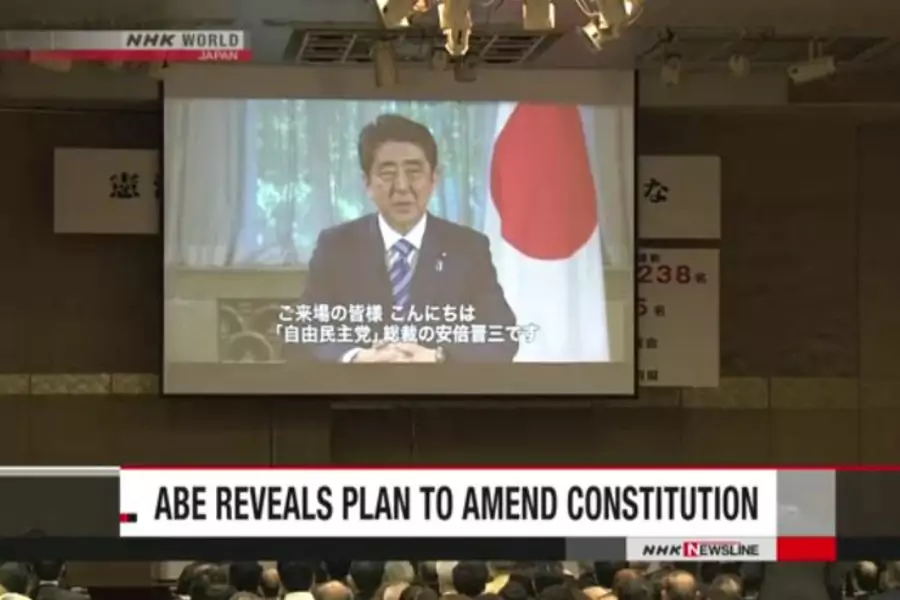Japan’s Constitutional Debate Accelerates

This blog post is part of a series entitled Will the Japanese Change Their Constitution?, in which leading experts discuss the prospects for revising Japan’s postwar constitution.
May 3rd was Constitution Day in Japan, or kenpō kinenbi, a holiday to celebrate Japan’s postwar democracy. It has been seventy years since Japan’s constitution was promulgated, and no change in the document has yet been made.
More on:
Prime Minister Shinzo Abe, however, wants to change that. He presented his plan on Wednesday in a video message to a Public Forum on Japan’s Constitution, or kōkai kenpō fōramu, cosponsored by the Citizens’ Association for Creating a Constitution for a Beautiful Japan, Utsukushii Nihon no Kenpo wo Tsukuru Kokumin no kai, and the Private-Sector Study Group on Constitution, Minkan Kenpō Rinchō. Abe promised that before the end of his time in office, the document adopted under U.S. occupation that changed the balance between the state and Japanese society as well as the trajectory of Japan’s relations with the world would be amended. Abe set the date for 2020, the same year that Japan will host the Olympics. Like the Tokyo Olympics of 1964, the prime minister argued, the upcoming Olympics will be a time of rebirth for Japan, and he has linked this prospect of a renaissance for Japan with constitutional revision. Surprising many, even within his own party, Abe also took aim at Article Nine, the cherished “no war” clause, saying he wanted to add reference to the constitutionality of the nation’s Self Defense Force.
Needless to say, Abe’s forthright statement of his intent set off a flurry of reaction in Japan. Opposition political parties decried his focus on the nation’s military, while leading members of his own party publicly noted that there was no consensus within the party on Abe’s objective.
Last summer, we introduced a series of essays on Japan’s constitutional debate written by those within Japan who seek to shape their nation’s debate. The full series can be found here.
Article Ninety-six of the constitution sets forth the revision process. Both houses of the Diet must agree on a proposal and pass it with a two-thirds majority. Thus our series begins with the politicians who will lead the debate, and representatives of Japan’s leading political parties share their thoughts with us.
The second step will be a national referendum. Thus we look at existing polling on public opinion to gain insight into how the Japanese people feel about their constitution and how those attitudes evolved over time.
More on:
Finally, we turned to a variety of advocates and experts within Japan who are active in the public debate. These Japanese voices reveal a complex array of aspirations for Japan, and deep passions about the constitution’s influence on Japanese society.
In honor of Constitution Day, we have five additional essays to share by scholars of Japan from the United States, South Korea, and China. Professor Helen Hardacre of Harvard University observes how religious groups in Japan are reorganizing around the prospect of revising the constitution. Professor David Law of Washington University in St. Louis compares the way Japan has approached revision with other constitutional democracies. Professor Adam Liff of Indiana University shares his thoughts on the way Abe’s reinterpretation of the Article Nine to allow for collective self-defense has affected the operations of Japan’s military. Professor Yongtao Gui of Peking University offers a perspective on how Chinese might react to the Abe cabinet’s proposal for constitutional revision, especially related to Article Nine. Professor Seong-ho Sheen of Seoul National University reflects on Japan’s constitutional debate and how it is likely to be viewed within South Korea. To conclude our series, I will highlight some of the themes likely to emerge now that Japan’s prime minister has set his sights on accomplishing revision in the next several years.
The prospect of constitutional revision in Japan is now upon us, and over the next three years, the Japanese people will embrace one of the most significant political conversations in generations. For those of us outside of the country, it may offer an unprecedented window on how multiple generations of Japanese understand their society, its accomplishments and limitations, and its future needs.
 Online Store
Online Store